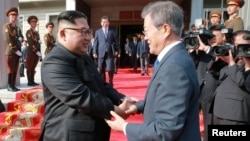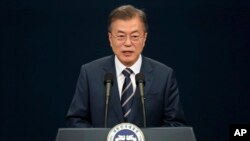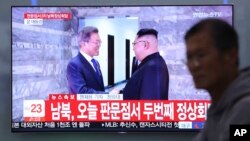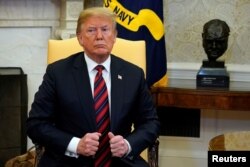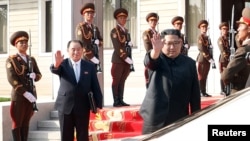South Korean President Moon Jae-in said he urged North Korean leader Kim Jong Un to directly engage with Washington to salvage the June 12 nuclear summit with the U.S., when the two leaders held a surprise second inter-Korean summit Saturday.
“I emphasized that the two sides must directly communicate in order to eradicate any misunderstandings, and preliminary talks through working-level negotiations on key agendas are necessary,” said President Moon at a press briefing in Seoul Sunday.
Security concerns
North Korea requested the meeting between Kim and Moon after U.S. President Donald Trump on Thursday canceled the Singapore summit. Trump said his decision was based on the “tremendous anger and open hostility displayed” by North Korea officials recently over U.S. demands that Pyongyang follow the Libya denuclearization model.
North Korea sees that model for rapid and complete denuclearization as a threat to the Kim government’s security, since Libyan leader Moammar Ghadafi was later overthrown and killed by his own people, with support from a multinational military coalition that included the U.S.
Pyongyang has called for a more incremental process that links concessions to partial nuclear reductions and postpones complete denuclearization until the North’s security demands are met.
Moon met with Kim on the North side of the inter-Korean border, in the same village of Panmunjom where the two leaders held a summit in April. At that meeting, on the south side of the border, the two leaders jointly declared their support for the denuclearization of the Korean Peninsula.
On Saturday Moon said Kim reaffirmed his commitment to end his country’s nuclear weapons program, but shared his key concern that the U.S. would work to destabilize his rule despite any security guarantees it offers.
“What is uncertain for Chairman Kim Jong Un is not his willingness for denuclearization, but he has concerns over whether North Korea can trust the fact that Washington will end its hostile relations, and guarantee the security of the regime if North Korea does denuclearize,” Moon said.
Trump has said Kim would be both secure in his rule and rich, as the U.S. and other countries would offer substantial economic aid and investment.
Summit planning
Pyongyang has taken a conciliatory tone in response to the cancellation of the summit. KCNA, North Korea’s official state news agency, reported Sunday that that Kim Jong Un “expressed his fixed will” to hold the summit with President Trump and “thanked” President Moon for acting as a mediator to reconcile the differences between North Korea and the U.S.
President Moon also emphasized that North Korea demonstrated “its strong intentions” by unilaterally suspending nuclear and missile tests since November of last year and demolishing the Punggye-ri nuclear test site last week.
President Trump Saturday suggested that the canceled Singapore summit with North Korea could happen after all. He told reporters that working level talks with Pyongyang “are going very, very well.”
White House Press Secretary Sarah Sanders said in a statement Saturday, “The White House pre-advance team for Singapore will leave as scheduled in order to prepare should the summit take place.”
Inter-Korean relations
Moon and Kim also agreed to hold high-level talks June 1 and accelerate cooperation efforts, including holding military talks to ease border tensions, and continue planning for a reunion in August for families that have been separated by the division of Korea at the end of World War II.
This renewed show of unity and friendship comes after North Korea seemed to express its anger at the U.S. by punishing South Korea, in canceling recent working level inter-Korean talks and temporarily banning South Korean journalists from covering the nuclear site closing.
Pyongyang also recently pulled out of a joint North-South taekwondo exhibition that was to be performed in St. Peter’s Square in Vatican City this week in front of dignitaries including Pope Francis.
North Korea cited the U.S.-South Korea military drills as the source of the renewed tensions with Seoul and Washington. Pyongyang demanded an end to these joint exercises that it says are rehearsals for invasion. However Kim Jong Un earlier indicated that neither the joint drills, nor the U.S. military presence on the Korean Peninsula would not be an obstacle toward improving inter-Korean relations or in reaching a denuclearization deal with the U.S.
Lee Yoon-jee in Seoul contributed to this report.




